- Army
- Air Defense Systems
- Anti-tank systems and vehicles
- Armored Vehicles
- Armoured personnel carriers
- Artillery Vehicles and Weapons
- Command Post
- Communication Vehicles and Systems
- Electronic Warfare
- Engineer | Maintenance Vehicles
- Infantry Fighting Vehicles
- Main Battle Tanks
- Missiles
- Tactical and Logistic Vehicles
- Radars
- Unmanned Systems
- Weapons
- Navy
- Air
Wiesel 2
Wiesel 2 Rheinmetall
Light airborne tracked armored vehicle - Germany
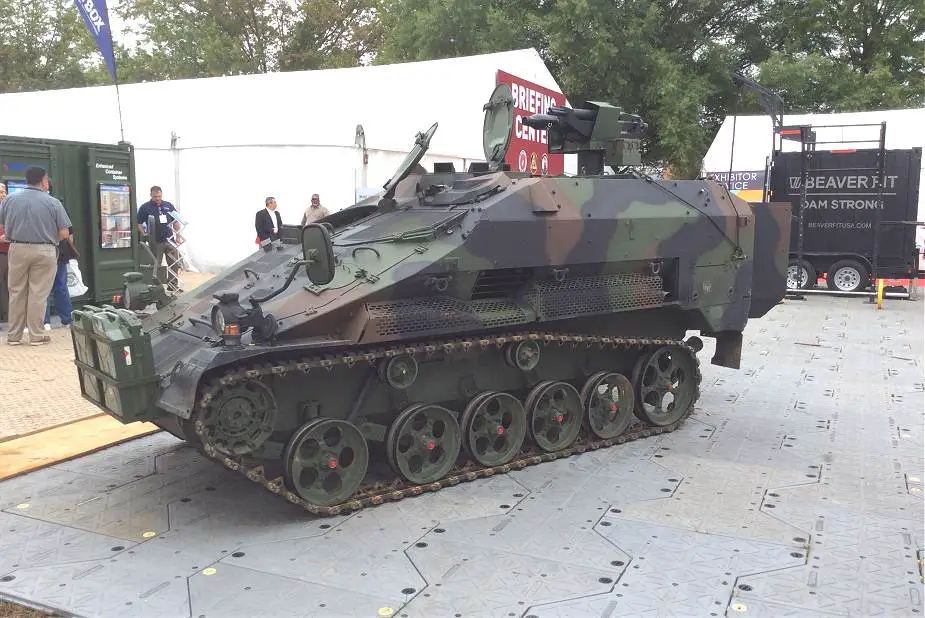
Description
The Wiesel 2 airborne armored vehicle is a further development of the Wiesel 1. The Wiesel 2 has an extended hull and a more powerful engine. It is currently in service with Germany. The prototype of the Wiesel 2 light armored air-transportable vehicle, developed by the now Rheinmetall Landsysteme as a private venture with the assistance of a number of subcontractors, was completed at Kiel in mid-1994. Market studies by the company showed that there is a requirement for a new version of the Wiesel with an increased volume and payload to enable it to carry out a wide range of additional missions on the battlefield, including the support of the existing Wiesel 1 vehicles which are purely weapon carriers. The Wiesel 2 is a multi-purpose carrier, used for a wide range of missions, including reconnaissance, command and control, battlefield surveillance, anti-tank and anti-aircraft weapon carrier. The vehicle offers better protection for the crew, compared with its predecessor. It is also fitted with an NBC protection system. The Wiesel ("weasel") 2 is the perfect answer for airborne forces, ensuring flexibility, mobility, and rapid availability on the ground. Extremely versatile, the Wiesel 2 vehicle system can be airlifted by helicopter and can be used to carry out a wide variety of missions such as reconnaissance and command operations, evacuating wounded personnel, and transporting ammunition.
Wiesel main variants:
- Wiesel 2 Light Air Defence System: (leichtes Flugabwehr System - leFlaSys) Wiesel 2 Air Defence Command Post
- Wiesel 2 Air Defence Reconnaissance and Fire Control Vehicle (RFCV): fitted with air defense radar
- Wiesel 2 Air Defence Weapon Carrier (Ozelot): fitted with air defense missile launchers (two box launchers containing four ready-to-fire Stingers, or, alternatively, a (currently unknown) number of vertical launch cells with LFK NG missiles)
- Wiesel 2 Ambulance: the rear side of the vehicle is adapted to carry injured soldiers
- Wiesel 2 Engineering Scout: combat engineer reconnaissance
- Wiesel 2 Command Post: battalion command post
- Wiesel 2 Advanced Mortar System: a 120mm mortar is mounted at the rear of the vehicle
Technical Data
| Armament |
|
The main armament for the version Wiesel 2, command post vehicle consists of a Krauss-Maffei Wegmann cupola armed with an externally mounted 7.62 mm MG3 machine gun. The Krauss-Maffei Wegmann 7.62 mm MG3 machine gun mounts enable the weapon to be fired from under complete armor protection. The commander position is directly behind the driver position. The slightly higher position gives him a good all-round-view. Five smoke grenade dischargers are mounted to the front of the hull.
|
| Design and protection |
|
The layout of the Wiesel 2 is similar to the Wiesel 1, with the engine compartment front left, driver front right, and the remainder of the vehicle for the troop compartment. The hull of the Wiesel 2 is of all-welded steel construction providing the crew with protection from 7.62 mm small arms fire and shell splinters. The driver sits at the front of the vehicle on the right and has three-day periscopes for observation to the front and sides; the center one can be replaced by a passive periscope for night driving. The usable size of the interior of the vehicle was increased from 2m³ to 4m³, compared to the Wiesel 1 model. Taking advantage of these features, Rheinmetall Landsysteme has paved the way for other variants of this system by the development of the Wiesel 2. A door is mounted into the rear of the basic version. This does not only let the crew enter and leave the vehicle quickly but also makes faster loading of the vehicle possible. The larger interior of the Wiesel 2, ensures the transport of up to seven men in the Armored personnel carrier version. The Wiesel 2 Battalion command post version has a crew of three: driver, commander, and battalion commander.
|
| Mobility |
| The Wiesel 2 shares a number of common components with the earlier Wiesel 1 but has a new Diehl Type 622 track and a new power pack. The new power pack consists of the new low-emission Audi 1.9 liter four-cylinder turbocharged diesel developing 109 hp, which is already in volume production for the Audi 100 car, coupled to a ZF LSG 300/4 automatic transmission. The engine has an electronic control system that automatically tunes the engine and transmission output depending on the vehicle weight. Suspension on either side consists of four dual road wheels, a drive sprocket at the front, an idler at the rear, and two track-return rollers. |
| Accessories |
| An integrated NBC defense system as well as a combined cooling and heating system in the crew compartment provide better means of survival for the vehicle. The Wiesel 2 is the perfect vehicle for Rapid Reaction Forces. Rapid Reaction Forces must be present in the operational area quickly. Great mobility is required of them and usually, the airborne brigades will be involved in such missions. Key functions are supported by means of the light, armored Wiesel 2. The Wiesel 2 is air-transportable and thus contributes on the whole to the airborne. The Wiesel 2 can be used in a wide range of missions such as command and reconnaissance operations, air defense, recovery of the wounded, and supplies of ammunition. The Wiesel family of vehicles is characterized by easy maintenance and repair. The Wiesel 2 Command Post has been developed to meet the requirements of the German airborne forces and has two workstations HEROS including a seven-inch monitor, latest state-of-the-art VHF and HF radio equipment as well as a GPS system. The mobile Command, Control and Information System (C2IS) HEROS is commissioned by the Federal Armed Forces (Bundeswehr) and developed under the direction of ESG Elektronik system- und Logistik-GmbH and is deployed in multinational organizations. The system assists the command process from corps to division and down to brigade level. At the moment the Wiesel 2 is one of the few vehicles which can be air shipped in the medium-sized transport helicopter CH-53 G offering adequate protection, space, and load capacity. The Wiesel 2 variants are the ambulance, the engineer reconnaissance vehicle, the anti-aircraft missile carrier OZELOT, the reconnaissance and fire control vehicle, the self-propelled mortar carrier, the ammunition carrier vehicle, the antitank HOT missile weapon station carrier, and the field observation vehicle Argus. |
Specifications
| Armament | Armor |
| One 7.62 mm machine gun | Protection against small arms 7.62mm and shell splinters |
| Country users | Weight |
| Germany | 4,100 kg combat condition |
| Designer Country | Speed |
| Germany | 70 km/h maximum road speed |
| Accessories | Range |
| Infrared night vision, NBC protection system. | 550 km |
| Crew | Dimensions |
| 6 soldiers maximum | Length: 4.20 m; Width: 1.85 m; Height: 2.11 m |
Details View
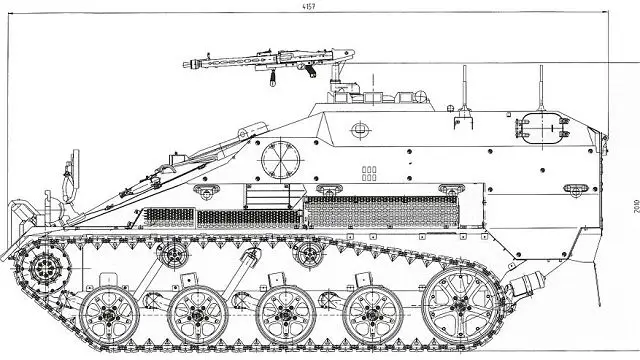 |
|
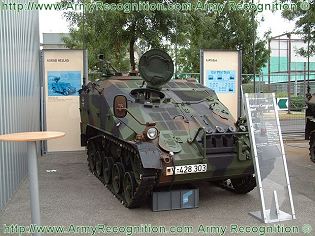 |
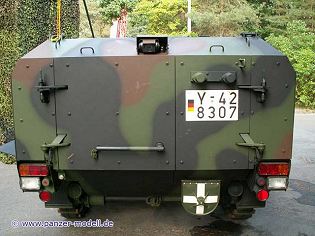 |
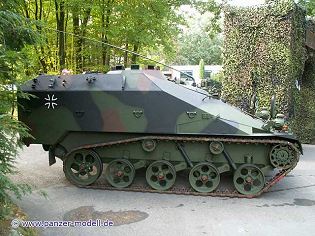 |
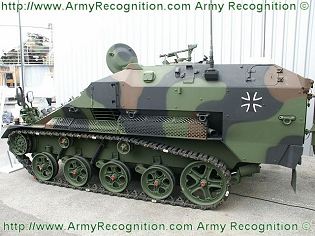 |
Pictures - Video



























